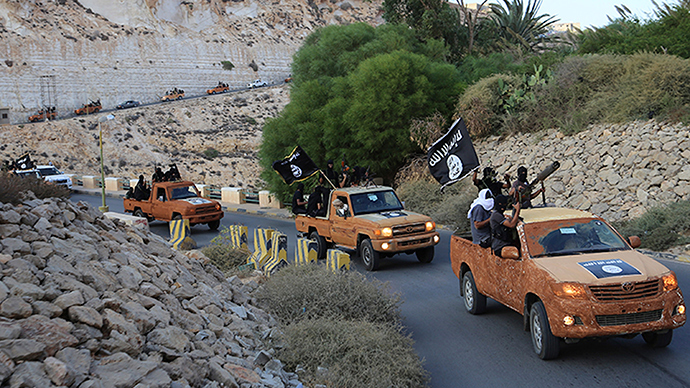Syria, Iraq turned into ‘international finishing school for extremists’ – UN report

Some 22,000 foreign fighters from around 100 countries went to Syria and Iraq to join various radical groups, experts have told UN Security Council. The area has turned into a global training ground for extremists.
Syria and Iraq are world’s biggest hotbeds for extremists linked with various offshoots of Al-Qaeda, the Islamic State (IS, formerly ISIS/ISIL) and similar groups, a report seen by Reuters claims.
“For the thousands of [foreign fighters] who traveled to the Syrian Arab Republic and Iraq ... they live and work in a veritable 'international finishing school' for extremists as it was in the case in Afghanistan during the 1990s,” the experts wrote in their report submitted to the UNSC in March.
Other nations have problems with foreign fighters as well. Some 6,500 are fighting in Afghanistan, while Yemen, Libya, Pakistan and Somalia are infiltrated by hundreds of foreign extremists, according to the report. Libya shows a particularly worrisome development, as since the start of 2015 it experienced an inflow of foreign fighters, reversing the previous trend of supplying extremists to other countries.
The increasingly globalized nature of Islamist extremism poses a medium-term threat through “plug-and-play social networks for future attack planning - linking diverse foreign fighters from different communities across the globe,” the experts warned.
READ MORE: Assad: Anti-ISIS coalition doesn’t want to get rid of Islamic State completely
They added that if Islamic State is defeated by the US-led coalition in Iraq and Syria, an unintended consequence could be a scattering of the group’s members across the world.
The danger that Syria would become a hotbed for international terrorism was hard to overlook since the early days of the armed conflict there. The government of President Bashar Assad was ringing the bell saying foreign fighters were increasingly present among the rebel forces for years and accusing its neighbors like Turkey of turning a blind eye on the traffic of extremists across the border.
The Western public realized the threat only after the IS launched, from its Syrian stronghold, a lightning campaign and took over a large part of Iraq. The self-proclaimed caliphate’s military victories were mirrored by an aggressive recruiting campaign that lured hundreds of Europeans and Americans into their ranks.
Those fighters are now considered a serious threat, as they are expected to return to their home countries with their guerrilla warfare experience, contacts among extremists and a willingness to launch attacks on home soil.
“We have to deal with the threat of foreign fighters planning attacks against our people,” British Prime Minister David Cameron declared last year as he was announcing that his government would be able to ban suspected British jihadists from returning to UK.
“The root cause of the challenge we face is the extremist narrative. So we must confront this extremism in all its forms. We must ban extremist preachers from our countries. We must root out extremism from our schools, universities and prisons,” he added.
READ MORE: UK fears homecoming of ‘London boys’ fighting in Syria
Meanwhile in the Middle East, Washington’s stated solution to the rise of extremists is a bombing campaign, which is supposed to help Iraqi troops take back the land taken from them by the IS. At the same time the US is training “moderate rebels” from Syria in a bid to make them capable to fight against the extremists and the Syrian government alike.
The strategy is flawed as it ignores the root of the problem, believes Lawrence Freeman from Executive Intelligence Review Magazine.
“We have to expose those who are behind the funding and coordination and the ideology of ISIL and Al-Qaeda,” he told RT. “There are indications continually that the Wahabi-Salafist ideology which is supported by the Saudi kingdom is being nurtured in a key component of ISIL and Al-Qaeda, and also Boko Haram [in Nigeria].”
The other key component would be economic development, which would give the people an alternative to joining the extremists, Lawrence added.












